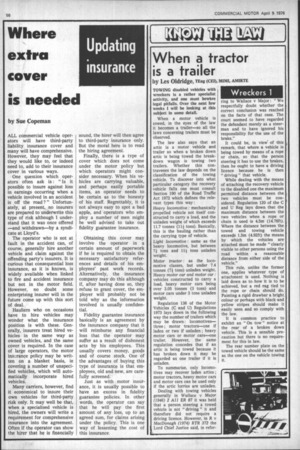Where extra cover is needed
Page 58

If you've noticed an error in this article please click here to report it so we can fix it.
by Sue Copeman
ALL commercial vehicle operators will have third-party liability insurance cover and many will have comprehensive. However, they may feel that they would like to, or indeed need to, add to their insurance cover in various ways.
One question which operators often ask is : " Is it possible to insure against loss in earnings occurring when a vehicle involved in an accident is off the road ? " Unfortunately, at present, no insurers are prepared to underwrite this type of risk although I understand that it was once offered —and withdrawn—by a syndicate at Lloyd's.
The operator who is not at fault in the accident can, of course, generally hire another vehicle and claim against the offending party's insurers. It is curious that consequential loss insurance, as it is known, is widely available when linked to fire and accident insurance but not in the motor field. However, no doubt some enterprising insurer will in the future come up with this sort of deal.
Hauliers who on occasions have to hire vehicles may wonder what the insurance position is with these. Generally, insurers treat hired vehicles in the same way as owned vehicles, and the same cover is required. In the case of large operators, the motor ins:.:rance policy may be written on a blanket basis, ie covering a number of unspecified vehicles, which will automatically incorporate hired vehicles.
Many carriers, however, find it economical to insure their own vehicles for third-party risk only. It may well be that, when a specialised vehicle is hired, the owners will write a requirement for comprehensive insurance into the agreement. Often if the operator can show the hirer that he is financially sound, the hirer will then agree to third-party insurance only. But the moral here is to read the hiring agreement.
Finally, there is a type of cover which does not come under the motor policy but which operators might consider necessary. When his vehicles are carrying valuable, and perhaps easily portable items, an operator needs to be certain as to the honesty of his staff. Regrettably, it is not always easy to spot a bad apple, and operators who employ a number of men might he well advised to take out fidelity guarantee insurance.
Obtaining this cover may involve the operator in a certain amount of paperwork if he is required to obtain the necessary satisfactory references and details of his employees' past work records. Alternatively, the insurance company may do this although if, after having done so, they refuse to grant cover, the employer will probably not be told why as the information involved is usually confidential.
Fidelity guarantee insurance basically is an agreement by the insurance company that it will reimburse any financial loss that the operator may suffer as a result of dishonest acts by his employees. This usually covers money, goods and of course stock. One of the advantages of buying this type of insurance is that employees, old and new, are carefully screened.
Just as with motor insurance, it is usually possible to have an excess in fidelity guarantee policies. In other words, the operator can say that he will pay the first amount of any loss, up to an agreed sum, for claims arising under the policy. This is one way of lessening the cost of this insurance.




























































































































